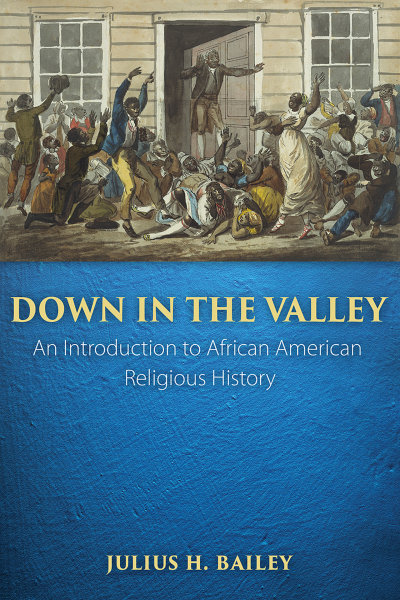Read what Julius H. Bailey has to say about his new book!
Q: What was your inspiration behind writing this book? What do you hope it accomplishes for students? What do you want the book to accomplish in the study of African American religious history?
A: Having taught the introduction to African American religions course several times, I was always searching for a central textbook for the course. When I was unable to find one, I decided to write a textbook that would combine the latest research in the field of religious studies with the classic studies of African American religious life. My hope is that students will be excited about the vast variety and diversity of African American religious life. While the study of African American religious history has tended to focus on Christianity, my goal was to write a book that engaged the diversity within black churches, the various world religions that black Americans have been a part, as well as black new religious movements that have sometimes been marginalized in the study of African American religions.
Q: Can you briefly describe the organization of your book, and explain how Down in the Valley stands apart from other historical introductions to African American Religions?
A: The book begins by considering the various theoretical frameworks that scholars have brought to the study of African American religions and then moves historically from African Traditional Religions, the religious life of enslaved Americans, African American religious institutions, enduring themes in nineteenth-century African American religious life, African American new religious movements, and contemporary developments in African American religions. While many surveys of African American religions end with the Civil Rights Movement, Down in the Valley expands the timeframe that most books cover beginning with African Traditional Religions and bringing the central themes and issues into the twenty-first century.
Q: Briefly speak to the difficulty with defining African American religions. How you address in your book the nuanced perspective of “authentic” religions and how “American” (or not) these religions are?
A: Defining African American religions is one of those concepts that seems straightforward upon initial consideration, but becomes more challenging the longer you consider the question. There have been religions that emerged from within African American communities, but African Americans have also brought a distinctive understanding and practice to a range of world religions. So rather than trying to definitively define the boundaries of "authentic" black religion or determining how "American" it is, the book moves fluidly between the big picture umbrella term "African American Religions" and the amazing diversity across traditions and localities.
Q: What has the relationship of historical (the Civil Rights Movement) and recent (Black Lives Matter) social and political movements been with African American religious traditions?
A: Much like during the Civil Rights Movement, black churches have been a central source of support for members of their communities and this has extended into the present with movements such as Black Lives Matter.
Q: What do you find most fulfilling about the study of African American religions and their history?
A: I really enjoy studying African American religions for a number of reasons, but perhaps most prominently is that you learn something new every day. There is always more richness to uncover and finding new sources and creative ways to engage and understand voices from the past that are all too often silenced or marginalized in the study of American history is an ongoing challenge.
Q: What do you find most fulfilling about the study of African American religions and their history?
A: I really enjoyed writing the book and describing the diversity of African American religious life. The chapter on black new religious movements, in particular, highlights the creativity of many African American communities to be able to construct stories of the past that empower people in the present that go beyond the trauma of the Middle Passage and the tragedy of the Atlantic slave trade.
